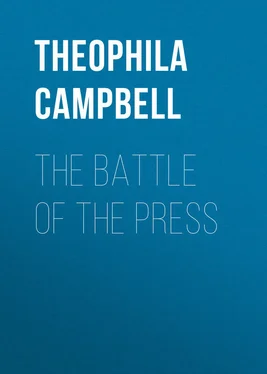Theophila Campbell - The Battle of The Press
Здесь есть возможность читать онлайн «Theophila Campbell - The Battle of The Press» — ознакомительный отрывок электронной книги совершенно бесплатно, а после прочтения отрывка купить полную версию. В некоторых случаях можно слушать аудио, скачать через торрент в формате fb2 и присутствует краткое содержание. ISBN: , Жанр: foreign_antique, foreign_prose, Историческая проза, на английском языке. Описание произведения, (предисловие) а так же отзывы посетителей доступны на портале библиотеки ЛибКат.
- Название:The Battle of The Press
- Автор:
- Жанр:
- Год:неизвестен
- ISBN:http://www.gutenberg.org/ebooks/38370
- Рейтинг книги:4 / 5. Голосов: 1
-
Избранное:Добавить в избранное
- Отзывы:
-
Ваша оценка:
- 80
- 1
- 2
- 3
- 4
- 5
The Battle of The Press: краткое содержание, описание и аннотация
Предлагаем к чтению аннотацию, описание, краткое содержание или предисловие (зависит от того, что написал сам автор книги «The Battle of The Press»). Если вы не нашли необходимую информацию о книге — напишите в комментариях, мы постараемся отыскать её.
The Battle of The Press — читать онлайн ознакомительный отрывок
Ниже представлен текст книги, разбитый по страницам. Система сохранения места последней прочитанной страницы, позволяет с удобством читать онлайн бесплатно книгу «The Battle of The Press», без необходимости каждый раз заново искать на чём Вы остановились. Поставьте закладку, и сможете в любой момент перейти на страницу, на которой закончили чтение.
Интервал:
Закладка:
"I am, Sir,
"Yours with respect,
"Richard Carlile."
This gentleman and his wife were the first to send a contribution to Carlile in prison of £10 ($50), and continued their subscription under the name of "Alexander and Jane Littlehelp". These two most generous friends helped almost everyone who was persecuted for opinion's sake in the same bountiful manner. Mr. Morrison and Carlile were still corresponding as late as 1840, when Mr. Morrison died.
Carlile improved the opportunity of his life, i.e., his prison life, by a very thorough study of the origin of religions, more particularly that of the Christian religion. He procured by purchase or loan every known authority, and made himself the master of the subject. He perfected himself in grammar and in handwriting, having a complete system of this sent to him at Dorchester Gaol; and later when he was allowed visitors, had a writing-master come to the prison to instruct him. Some of his letters still extant, and which were written before his final illness, look almost like copperplate engraving. He also studied theology, political economy, history, phrenology, literature, etc. He turned the quiet and solitude of the gaol to good account. He conducted two weekly papers through the greater part of his term, and kept up a large and varied correspondence, besides making a thorough and critical digest and condensation of the old and new Testament in reply to the Rev. Thomas Hartwell Home's pamphlet on "Deism Refuted". This digest is to-day as useful and time-saving as ever to the student and seeker after truth. It was during the early year of this, his memorable imprisonment, that the disgraceful attempt to destroy Queen Caroline was made. This was the blackest of all the many villainies which were allowed to disgrace the reign of the Georges 3rd and 4th. Carlile espoused her cause from the first, not because she was a queen, but because she was a grossly maligned and persecuted woman. There were few who dared to declare themselves openly to be her defenders. Carlile used his pen with fearless vigor in her behalf, and did not hesitate to use the words of forceful truth against her persecutors. Having the confidence of many thousands of his own readers, he could, and did, do much to create the popular feeling and uprising of the people in her defence, to the everlasting dismay of her enemies, and of whom, next to her husband, the notorious Castlereagh was at the head. The story of this unhappy Queen is most pathetic as portrayed from week to week in the Republican , and of itself would, and no doubt has, filled the pages of more than one book. Yet the open defeat of her enemies and the complete exoneration of herself from all the villainous charges brought against her, did not ensure her either a peaceful or a long life. There were more ways than one of disposing of a person who stood in the way, however innocently, of designing persons, and she paid the penalty of her position in spite of her popularity.
The events occurring in Spain at that time, and the attempts that were then and there made for a free and representative government, gave subject and opportunity for many lively editorials on Carlile's favorite subject, "Republicanism", and left him, as he said, "neither an idle nor a dull moment, nor one to spare". To add to his duties and anxieties came frequent annoyances to Mrs. Carlile from the authorities in the form of threats of prosecution. She was frequently arrested, but her trials were as frequently postponed from time to time, only making matters more aggravating by their uncertainty. They were finally brought to an issue, and were laconically announced in the Republican thus: – "Trial of Mrs. Carlile. Verdict, as usual, Guilty!"
All these publications for which she was sentenced had been on sale for a long time without interference, except the twopenny "Mock Trial" sheets, and thousands were sold without any complaints being heard about them. The trouble was that Carlile's persecutors had fondly and foolishly thought that they had effectually silenced him for ever; and when the place at Fleet Street was reopened, and the business revived and carried on as briskly as ever, they were really at a loss to know what to do at first. It would never do to keep him in prison and allow the business for which he was punished to go on unmolested; so they proceeded against the wife as we have seen, and got judgment against her. Next they proceeded against the shopman, Mr. Davison, and got a judgment against him and sentence of imprisonment. But now comes Carlile's sister, Mary Ann Carlile, who had been quietly at work making herself familiar with the details of the business, so as to be able to take her place in the list of persecutions for opinion's sake, and letters began to pour in upon Carlile from scores of young people offering to supply the place of those removed, and in a very short time he had a long list of names of volunteers, ready for business or prosecution, it mattered not which.
CHAPTER VI. SIR ROBERT GIFFORD AND THE ODIOUS "SIX ACTS"
As briefly set forth in a letter to Sir Robert Gifford, January 14th, 1820, on the new Acts of the Legislature intended to expel even the shade of liberty from this country (England): —
"My Learned Friend,
"I venture to address you by that common epithet so-much in vogue with those who profess to be opposed to each other in courts of law, and I pledge my word to you with just the same feeling. My views are not so confined, nor my mind so narrow, as to imagine that you have inflicted an injury upon me beyond the period of my confinement; on the contrary, I reflect with pleasure on all that is past, and congratulate myself that by your assistance I have sown the seeds of my future prosperity. The prominent part you have taken in bringing forward and supporting the late Acts of Parliament under the auspices of your patron and preceptor, Lord Castlereagh, has induced me to address you on their several bearings, and to show you how far they may be nullified. Let me first premise that, under the present state of public opinion, their nature and character is such as to render them short-lived. I will commence with 'The Traverse Bill', which is admitted on all hands to be the least obnoxious, as one clause of it has enacted a real benefit by taking away from your office that arbitrary and capricious power of suspending prosecutions over the heads of individuals to any length of time. In consequence of this Act, I shall have the satisfaction of making you acknowledge the abandonment of at least four informations that have been suspended over my head ever since the Michaelmas term 1817, or of bringing them immediately to trial. How far I shall succeed in making you give up or proceed with those half-dozen, or dozen others of later date, remains to be seen. I cannot quit this subject without saying that it will give me much pleasure to meet you often in the Court of King's Bench, and hope that your known dissent from the hypocritical professions of the day will further induce you to promulgate those sentiments that you privately and I publicly espouse. With respect to the intended effect of the Traverse Bill. As to accelerating trials for misdemeanors, there is some ground for complaint, because equal justice is not given to plaintiff and defendant to hasten on his trial, and for this the Bill has not provided; whilst on the other hand, he is debarred from the benefit of a delay. The excuse set up for this part of the Bill was, that I had protracted the time of my trial for near twelve months. This, Sir Robert, you know to be false, the delay was on your part, and on the part of your predecessor. I am inclined to believe that prior to the 16th of August, my prosecution was in some measure abandoned. Having been present at the Manchester meeting and narrowly escaped the sabres of the yeomanry, and got better through the truncheons of Nadin and his gang than some of the other attendants of that meeting; and lastly, having eluded the vigilance and search of the magistrates of that lawless town, I came to London and told the plain, unvarnished tale of the massacre committed by the yeomanry at the instigation of the magistrates. The necessity for getting rid of me was immediately resolved upon, that I might not in any instance give evidence on that subject. First, the project of bringing a charge of high treason against me was discussed and as soon abandoned, and the trial for the high-sounding charge of 'Blasphemy' agreed on, for the double purpose of getting rid of me as an evidence and of drawing the public attention from the Manchester affair. The Traverse Bill, considered in its proper character, is merely a clause of 'the Blasphemous and seditious Libel Bill' put into a different shape, to hide the severity of the latter. 'The search for Arms Bill' and the 'Drilling and Training Bill' are enactments of the most hideous character, which nothing but the guilty fears of its projectors could have produced. The latter should have been entitled 'An Act for the encouragement of private malice'. 'The Seditious Meeting Bill' is another of those destructive measures that has brought England on a level with Algiers. The Bills relating to the Press are now to be considered. It is with those, Sir Robert, you have given us a specimen of your disposition to annihilate the liberty of the Press altogether, for we must look on those Bills, not as the act of Parliament, but as the act of the Attorney-General. I shall therefore proceed to make my observations on them, and begin with that which is intended to increase the punishment for whatever you may be pleased to call blasphemous or seditious libel."
Читать дальшеИнтервал:
Закладка:
Похожие книги на «The Battle of The Press»
Представляем Вашему вниманию похожие книги на «The Battle of The Press» списком для выбора. Мы отобрали схожую по названию и смыслу литературу в надежде предоставить читателям больше вариантов отыскать новые, интересные, ещё непрочитанные произведения.
Обсуждение, отзывы о книге «The Battle of The Press» и просто собственные мнения читателей. Оставьте ваши комментарии, напишите, что Вы думаете о произведении, его смысле или главных героях. Укажите что конкретно понравилось, а что нет, и почему Вы так считаете.












